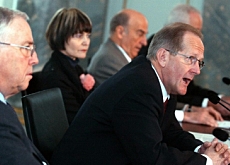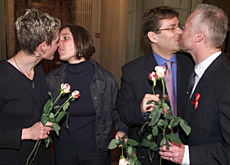Swiss vote to join Schengen area

Fifty-four per cent of Swiss have backed closer cooperation with the European Union on security and asylum issues in a vote on Sunday.
A proposal on legalising same-sex partnerships was also approved – with 58 per cent in favour.
Final results showed 54.6 per cent had voted for membership of Schengen/Dublin, with 58.03 per cent supporting a legal basis for gay partnerships.
A majority of cantons came out in favour of the gay-rights legislation, with opposition concentrated in the mainly Roman Catholic central and southern regions.
Support for Swiss membership of the Schengen and Dublin accords was also divided along geographical lines, with western Switzerland in favour and eastern Switzerland – excepting Zurich and Zug – against.
Turnout was above average, at around 56 per cent.
Reaction
On behalf of the government, President Samuel Schmid welcomed the positive outcome of the two votes.
Schmid said the “yes” vote for Schengen/Dublin vindicated the government’s policy on Europe and the conclusion of bilateral treaties with the EU.
“The government is convinced that the bilateral way is currently the only option and will allow Switzerland to intensify its cooperation with the EU,” Schmid told a news conference.
The Swiss president said the government would now focus its efforts on the next referendum, to be held in September, on extending an EU treaty on the free movement of people.
The EU also welcomed the result of the vote.
Diana Wallis, head of the European Parliament delegation responsible for relations with Switzerland, told swissinfo it was “good news for Switzerland”.
“Although Swiss membership of Schengen is not that important for the EU, it’s nice to have a successful vote after last week [when voters in France and the Netherlands rejected the EU’s constitution].”
Wallis added that the real test of Swiss/EU relations would come in September, when Swiss voters are due to decide whether to extend an accord on the free movement of labour to the ten new EU member states.
The EU is waiting for that vote before it ratifies a second set of bilateral treaties with Switzerland.
The rightwing Swiss People’s Party, which had campaigned for a “no” vote, reacted by calling on the government to retract its application for EU membership. It was supported by the Campaign for an Independent and Neutral Switzerland, which also opposed joining Schengen/Dublin.
Schengen and Dublin
Joining the Schengen area will mean Switzerland agreeing to abandon systematic identity checks on its borders. In return, the country will gain access to a Europe-wide electronic database on wanted and missing persons, illegal immigrants and property.
By signing up to the Dublin accord, the Swiss will be party to an agreement allowing member countries to turn away asylum seekers who had already filed a request in another signatory country.
Both accords – part of a second series of bilateral treaties with the EU – were approved by the Swiss government and parliament last year.
The justice ministry says the accords will not enter into force before 2008.
The Schengen SIS information system and Eurodac fingerprint database both have to be updated.
Gay partnership
The endorsement of the same-sex partnership proposal means that gay couples will receive the same legal rights as married couples in the areas of pensions, inheritance and taxes. But unlike married couples they will not be allowed to adopt children or have access to fertility treatment.
Same-sex unions will be considered legally binding and only a court will have the power to dissolve them.
The law, which will bring Switzerland into line with neighbouring Germany and France, was passed by parliament last year.
It is expected to come into force in 2007.
Registered partnerships already exist at a regional level in cantons Zurich, Geneva and Neuchâtel.
swissinfo
The vest majority of Swiss living abroad voted in favour of the Schengen/Dublin accords.
Five cantons count overseas ballots separately, including: Geneva, Basel City, Lucerne, Vaud and Appenzell Inner Rhodes.
In Appenzell Inner Rhodes, over 80% of overseas voters registered there voted yes to Schengen/Dublin. By contrast, those actually living in that canton rejected the accords by a margin of 68.5%.
The Swiss electorate have approved membership of the EU Schengen/Dublin accords with 54.6% in favour.
A new law on registering same-sex partnerships was approved by 58.03%.
Turnout in Sunday’s vote was higher than average at 55.9%.

In compliance with the JTI standards
More: SWI swissinfo.ch certified by the Journalism Trust Initiative











You can find an overview of ongoing debates with our journalists here . Please join us!
If you want to start a conversation about a topic raised in this article or want to report factual errors, email us at english@swissinfo.ch.